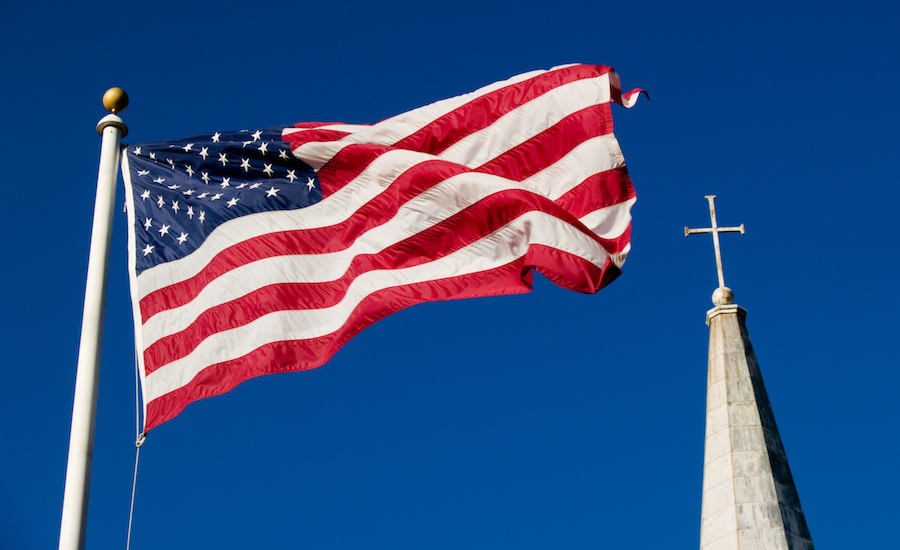
“On an appointed day Herod put on his royal robes, took his seat upon the throne, and delivered an oration to them. And the people were shouting, ‘The voice of a god, and not of a man!’ Immediately an angel of the Lord struck him down, because he did not give God the glory, and he was eaten by worms and breathed his last.” -Acts 12: 21-23
Today, First Baptist Church Dallas is hosting a “Celebrate Freedom Concert” featuring their pastor, Robert Jeffress, and President Trump, who Jeffress recently called “one of the great patriots of our modern era.” Last Sunday, FBC celebrated “Freedom Sunday;” complete with a presentation of colors, soldiers, guns, patriotic hymns, indoor fireworks, the whole shebang.
While most churches this 4th of July weekend won’t try to bust a bottle rocket from the balcony, many will sing the national anthem, pledge their allegiance to the American flag, and maybe even hear a sermon on 1 Peter 2:9 called “A Royal Nation: Brexit 1776.” Meanwhile, many other church-goers, myself included, will be mortified by such actions.
To be clear, I’m not opposed to mixing religion and government/politics. For one, it’s impossible not to mix the two, just like it’s impossible not to mix religion and music or religion and parenting. Religion, as David Dark has so helpfully pointed out, is ever consuming and all present. It’s the way we live and move and have our being in the world. It can be seen as easily in our credit card statements as in our church attendance.
Not just Christians, everyone brings religion into government, arguing for or against particular policies based on their own core commitments and values—values not shared by the whole of society, mind you. Asking someone to keep religion out of politics is like asking someone to fly by lifting the chair in which they’re sitting off the ground. It sounds swell, but it’s impossible.
Even if it were possible to silo religion in the church, away from the public square, Scripture forbids Christians from taking such an approach. The myth of neutrality is promulgated by secularism, not Scripture. That being the case, if the church isn’t trying to transform the culture, the culture is succeeding in transforming the church.
You see, the Bible isn’t just God’s word to the church, it’s God’s word to the whole world—everyone, everything. So, applying the Bible to every sphere of life (politics, art, family, etc.) isn’t involving the church in those areas, it’s involving Jesus. And it turns out, Jesus doesn’t just claim to be the King of the church, He’s King of the cosmos—which includes every square, even public ones. Nicholas Wolterstorff says it well:
“Since the content of Christian theology goes far beyond church and devotional life to life as a whole, and since its addressees extend far beyond church members to humanity in general, its arena must be civil society.”
I don’t take issue, then, with the church involving herself in national life. To the contrary, I’m quite happy for the church to take her message into the most sacred of State spaces—pray in Congress, display the 10 Commandments at the courthouse. What I oppose is the State taking her message into the most sacred of church spaces. I oppose that which causes a worship service to be marked more by a folksy, sentimental religiosity than a solemn, joyful reverence.
Bringing religion into government is responsible for William Wilberforce’s effort to abolish the slave trade in England and Martin Luther King Jr.’s tireless effort to see all God’s children treated equally irrespective of race in America. Bringing government into the church, on the other hand, brought us the ecclesial malaise and kowtowing which allowed Nazis to exterminate Jews on Saturday and receive the Eucharist on Sunday.
Christians are called to persuade the nation with the message of the church, not persuade the church with the message of the nation. One can faithfully use the State to advance the Kingdom, but God help the man who uses the Kingdom to advance the State. Setting fireworks off in a sanctuary is dangerous, but not just for the obvious reasons. Sure, it may cause someone to lose an eye, but it may also cause someone to lose sight of the purpose of worship, which is far more serious and far more likely.
So, this Sunday let’s observe the sacraments, hear the word preached, confess our sins, and sing about the grace and power and goodness of the Lord of all nations. Instead of This Land is Your Land, let’s sing This is My Father’s World. Instead of The Battle Hymn of the Republic, let’s sing A Mighty Fortress is our God. In other words, let’s pledge our allegiance solely to Jesus, finding our identity chiefly as heirs of God’s Kingdom. In addition to being what we’re commanded to do, it also produces what our nation actually needs: citizens attuned to the true, good, and beautiful; shaped by love in worship, sent out to seek the welfare of the city by promoting the common good.
















Excellent!